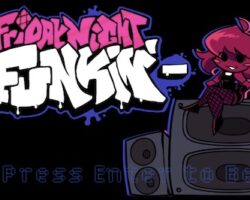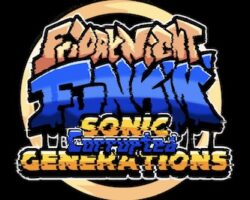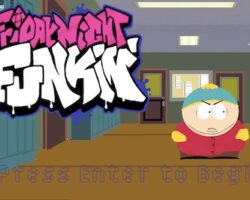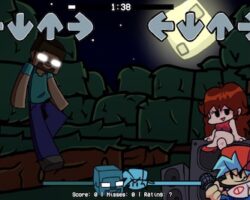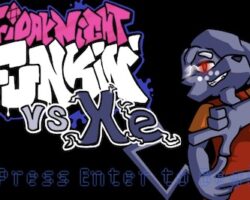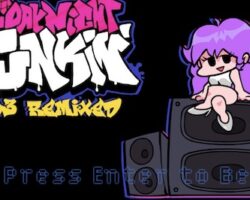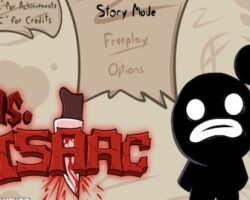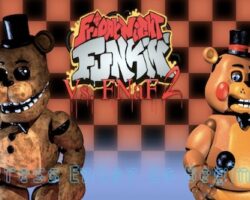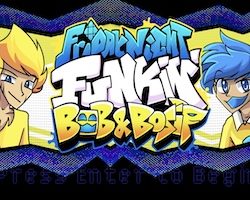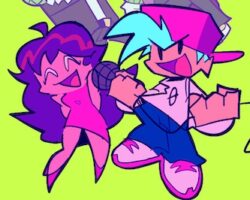Friday Night Funkin’ CG5 Edition
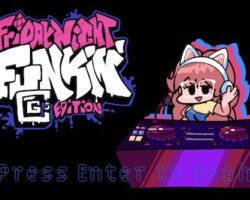
Introduced in 2020 by a team of independent developers, Friday Night Funkin’ (FNF) quickly ascended the charts to become one of the most popular rhythm-based indie games worldwide. This free-to-play game, characterized by its colorful retro aesthetics, catchy music, and compelling gameplay, has attracted millions of players and creators alike, driving a massive online community that continually contributes to its growth.
FNF operates on a simple premise: help the protagonist, referred to as ‘Boyfriend’, win over his love interest ‘Girlfriend’, by engaging in rhythmic musical battles against various characters. The player matches their inputs with the on-screen prompts in time with the music, transforming the typical video game narrative into a rhythmic, interactive experience.
Graphically, FNF draws heavy inspiration from the late ’90s and early ’00s Flash games, showcasing pixel art that resonates with nostalgic appeal. Its vibrant palette of neon colors, coupled with visually unique and distinctive characters, creates a captivating spectacle that never fails to entertain. The stylized animation brings the story to life, blending perfectly with the catchy music to create an unforgettable gaming experience.
Music is the heartbeat of FNF. The extensive original soundtrack features a range of genres, from electronic beats and hip hop to jazz and rock. Each week in the game presents a new adversary and a new set of songs, intensifying the game’s challenge and intrigue. The complexity of the rhythms escalates with each level, forcing players to improve their timing and speed to progress.
One of the most striking features of FNF is its vast, global community. This has been nurtured by the developers’ decision to release the game’s source code, encouraging fan-made mods that add new characters, songs, and storylines. These mods have played a substantial role in keeping the game fresh, as creators continually introduce inventive and unpredictable content. This spirit of creativity and collaboration has fostered a deep sense of community engagement and contributed significantly to the game’s success.
Gameplay in FNF is notoriously challenging. Players must navigate through increasing difficulty levels, requiring quick reflexes and sharp memory. But the game’s challenge is part of its appeal. It is a true test of rhythmic skills, hand-eye coordination, and adaptability. Many players cite the feeling of accomplishment after successfully completing a difficult song as one of the game’s key addictive factors.
Despite its challenging nature, FNF remains accessible. Its easy-to-understand mechanics and the availability of difficulty settings ensure that everyone from casual gamers to hardcore rhythm game enthusiasts can enjoy the game. Furthermore, the game’s family-friendly nature, devoid of explicit content, makes it a suitable choice for a wide age range.
The story in FNF, though minimal, is charmingly effective. The overarching narrative of Boyfriend trying to impress Girlfriend provides a relatable goal, and the eccentricity of the opponents, each with their unique personalities, keeps the game interesting. Despite its simplicity, the narrative aspect does a remarkable job of emotionally investing players in the game.
In conclusion, Friday Night Funkin’ is more than just a game; it’s a testament to the power of indie development, fan engagement, and the universal language of music. It’s a game that knows its strengths and leverages them to provide a unique, enjoyable, and challenging experience. Its thriving community, engaging gameplay, captivating graphics, and foot-tapping music make it a standout in the rhythm game genre, and its growing popularity indicates that it will continue to entertain and challenge players for a long time to come.

